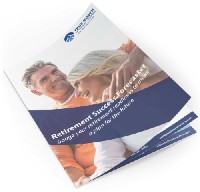KEY TAKEAWAYS
If you’re wondering how to protect yourself in bear markets, like the current one we’re facing with the coronavirus crisis, I’m going to share with you a simple rule that you should never violate when it comes to protecting yourself and your investment portfolio in retirement.
Maintain cash reserves in retirement for emergencies.
This rule is no different than when you’re working. Common advice out there is to maintain 3-6 months worth of cash. However, in retirement, the reality is you need a lot more cash than that!
In today’s video, you’ll learn:
- Why you need more cash in retirement.
- Exactly how much cash you should maintain for emergencies and those nasty bear markets.
- Where you should keep your cash… Under the mattress is not a good option!
Click here to watch the full video or read the full video transcript, below.
Why do you need more cash in retirement?
Why isn’t a few thousand dollars or 3-6 months worth of expenses in the bank enough? Well, those rules no longer apply when you’re retired for a couple of reasons:
You’re no longer working. When you’re retired, and the older you are, the harder it is to go out and find a part-time job or a side gig. If you have a sudden and unexpected expense or medical bills, paying for your emergency with a high interest credit card or having to liquidate your retirement portfolio can be devastating and can completely derail your retirement plans. Therefore, we need a lot of cash on hand in retirement.
You can reduce or suspend your portfolio withdrawals. If your portfolio drops 10 or 20%, you make that drop significantly worse by also taking money out and exacerbating the downturn in your portfolio. Having cash on hand will allow you to stop some of the bleeding and suspend your portfolio withdrawals in a market downturn. When you can do this, especially if it happens in the early years of retirement, you give yourself a better shot of not running out of money in retirement and preserving more of what you have in the downturn.
How Much Cash Should You Have?
At a bare minimum, you’ll want to keep 6 month’s worth of monthly expenses on hand for emergencies. If you spend $5,000/month, you’ll want $30,000 in cash, just for emergencies.
In addition, you’ll want to keep another 12 month’s worth of your portfolio withdrawals on hand to protect yourself in the next market downturn. Why? Well, the average bear market lasts 14 months. Some are shorter and some of the deeper ones are even longer.
If you can stop your portfolio withdrawals for a year while the stock market is reeling and in the midst of a recession, you can sleep better at night and not make the problem worse. 12 months of suspended withdrawals from your investment portfolio should be enough, even if the downturn lasts a little longer than that. If you take out $2,000 from your investment portfolio every month, you would want to keep a year’s worth of withdrawals in cash, that would be $24,000.

It seems like a lot, doesn’t it? In my opinion, the 6 months of expenses and the 12 months of portfolio withdrawals are the minimum. You could increase that amount, but I wouldn’t go too crazy, since the more cash you have on hand, the more it will dampen the long-term growth prospects on your money, since cash pays so little interest.
Where Should You Keep Your Cash?
Now that you’ve calculated how much cash you need to have on hand, where should you park that cash?
Savings Account: Of course, for maximum safety and FDIC coverage, you can just park it in savings at your bank. This will yield you the lowest amount of interest on your money, since bank deposits are still paying laughable amounts of interest.
Money Market Account: Another option is a money market account. It doesn’t have the FDIC insurance coverage of the bank account but is still very safe since it only invests in ultra short-term cash like investments. Money markets are my preferred place to park cash for clients.
Cd’s: Lastly, CDs are another great place for your cash. It does require that you tie your money up. However, you do have the FDIC insurance and the penalties for selling early in an emergency are typically worth it for the higher rate of interest that you can often earn.
What’s Your Game Plan?
How much cash do you have on hand right now? As you get closer to retirement, what’s your game plan for beefing that cash up, so that you can protect yourself against the blows of a bear market or being blindsided by an expensive emergency?
Hopefully after watching this video or reading this blog, you have some better guidance about how much cash is right for you in retirement. But more importantly, make sure that you have the discipline to build up and maintain that level of cash to help you weather all but the worst of storms in retirement.




